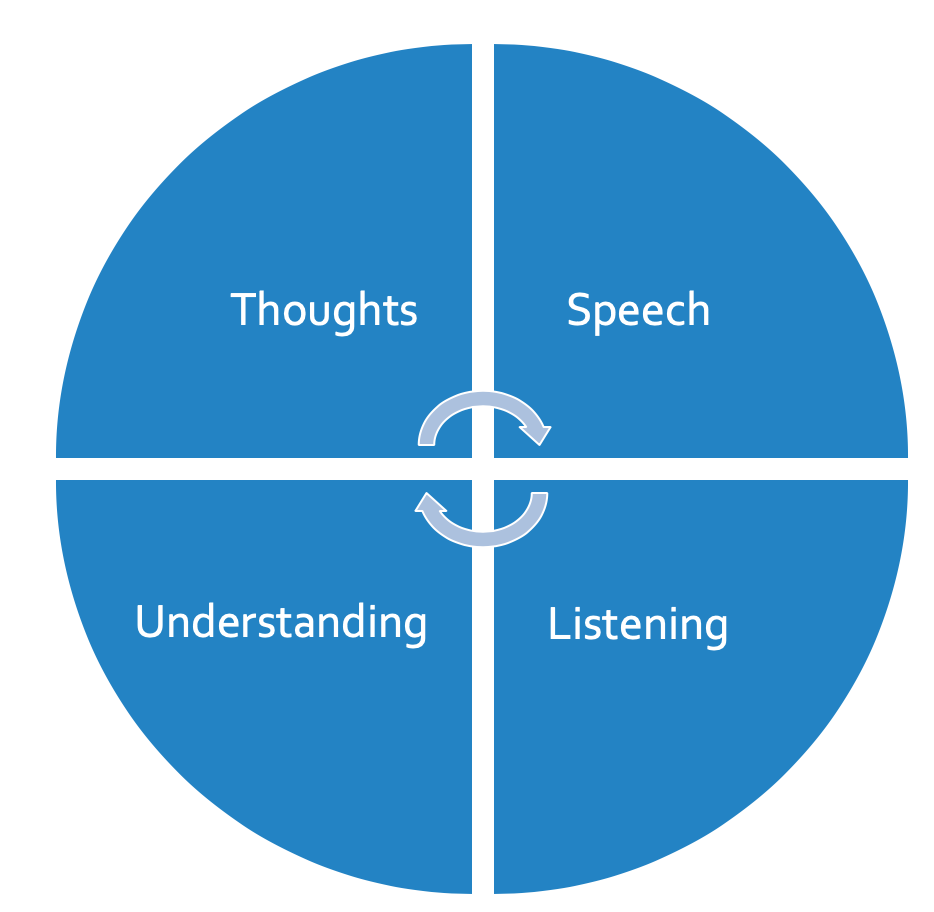Thinking back to watching a spelling bee in school, I had a situation where I spelled a word wrong. The judges asked me to spell /pēs/. I leaped to answer. This grammar rule that “i goes before e” was one I that I had mistaken many times before with the word “field”. They weren’t going to trick me.
I confidently spoke out each letter ” p-i-e-c-e”. The bell made a frightful noise. I was incorrect. My cheeks went red with embarrassment. I thought I knew the right answer for sure. The judge spelled out the right answer “p-e-a-c-e”. I went back to my seat and was in shock. I had given an answer, but I didn’t give THE right answer. By not asking the judges for context within a sentence, I got penalized. Jumping at the chance to be right, I didn’t weigh the other possible answers. I got punished for not asking a question and made a rash assumption. I forgot to ask for context. As a receiver of information, I needed to be clear on our understanding before sending out my response.
A word’s meaning has limitless possibilities until it is defined by its context.
Communication is the exchange of information. There are two roles: the communicator and the receiver. The communicator has thoughts and speaks them. The receiver of this information listens and attempts to understand what was heard. They gather their thoughts and respond. An initial misunderstanding can lead to a tangent and create momentum from a mismatch between these different stages. This is what causes miscommunication.
The intention of a communication’s input does not equal its output. Language is bidirectional. It is not a one-way street. All communication is based on interactions where it is the responsibility of the receiver and the listener to align information. The receiver of output takes action based on how they understand it. They can choose to gather more information after reacting to a message to respond.
The world has been changing fast due to COVID-19 and causing our nervous systems to create unnatural stress. This stress can be interpreted negatively while falling out of habits of going to the gym, a chaotic sleeping routine, or having a limited environment for different activities. This stress causes a fight or flight mentality where you are trying to seize the day and still live even though you are stressed out.
Stress in an alternate situation can be while lifting weights at your home gym. You are deliberately applying stress to your muscles in order to build strength.
This type of stress is intentional in order to build growth within your muscles. Stress in this context isn’t negative. It is desirable.
How do leaders effectively use their language?
Leaders need to start off by making sure they are defining the word in a described context. This requires precision. Through taking the time to align their definition with the audience, effective communicators are not assuming that they aligned on the interpretation.
Effective leaders spell out the answers with their language. One of the hats I wear, during my consulting work in leadership development, is as a project manager. Whenever I disclose new information, I become intentional with the information. I anticipate the questions that may come after sharing it. The individuals who consume the information I share may define it in an alternate way. Everyone has their own backgrounds in which they understand information. I need to ensure that the key objectives are understood.
When new information is communicated with an unclear definition it can lead to misleading actions. During this current pandemic, leaders and public health officials strongly encourage “social distancing”. The RedCross defines it to mean deliberately increasing the physical space between people to avoid spreading illness.
Without getting below the initial surface of what this means, someone being communicated to socially distance can misinterpret thinking they cannot socialize of any form. This can lead to extreme loneliness since this is something humans are not accustomed to. By being physically distanced, we can still be socially intertwined and more connected than ever before. It is up to us as the listener to dig deeper and know how to react to it. It is within our control to define a word to mean something different than we initially interpret it as.
An alternative way of interpreting this phrase, or a neologism, would be to “physically distance”. Through taking the preexisting phrase, we can redefine words. This can change everything about the actions we decide to make. We don’t need to be socially isolated.
How we react to words is within our control. Don’t make assumptions. We need to spell out the meaning and be intentional in how to interpret language. Effective communication improves life.



